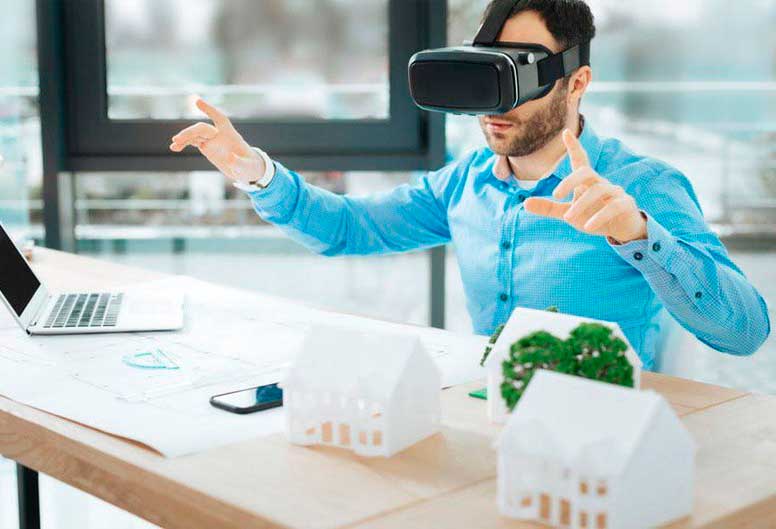Are we looking for ways to create a competitive advantage in real estate? Virtual reality is the answer. Digitalization in real estate is constantly evolving. Over the past few years, many new technologies have been developed that can be used in various industries. There has never been a better time to take advantage of innovation and get ahead of the competition. The use of drones has already changed the real estate industry, whether aerial photography or virtual tours. But virtual reality technology for real estate could also soon play an increasingly important role.
Virtual reality allows you to look at apartments, homes, and land in a whole new way. If you work in real estate and want to offer your customers an immersive experience, virtual reality is worth a closer look.
1. See real estate in a new way.
For some time now, drones have been able to take high-resolution photos and even videos. This development has already empowered the real estate industry. Still, there are more changes on the horizon: Virtual reality plays an increasingly important role in marketing, meetings, and viewings in the real estate sector.
It is more than just convenient to view a property remotely, without even having to go on-site: You can view a house, plot, or apartment at your leisure, get a reasonably reliable impression in advance and examine even the most minor details, such as whether the kitchen floor is made of natural wood. Often buildings can also be inspected from the outside, as can the rest of the property.
Even outside the house during a virtual reality tour, you can pay attention to all the little details that are important to you, such as the exterior lighting or the terrace flooring.
Previously, such seemingly insignificant details could only be learned during an on-site inspection. You can learn a lot about a property without even seeing it.
It saves you from visiting properties that wouldn't have been right for you anyway. Conversely, you can see in new light apartments or houses that you might not have called otherwise because they didn't seem very interesting to you at first.
2. Viewing houses and apartments before construction is complete.
Are you thinking about moving into an apartment in a new construction project still under construction? When virtual reality didn't exist yet, you had to wait until the building was finished to view it. Today, however, real estate companies can use VR to film an unfinished apartment to give you an idea of what it will look like.
This way, you can already have a better idea of your future new apartment and know what you can expect more precisely.
Virtual reality as a construction aid
Companies that build and sell houses can also benefit a lot from VR. They no longer need to work with blueprints and computer images but can virtually walk through the buildings before construction is even complete. It gives them a more accurate view of the project and allows them to move forward more quickly.
3. Speeding up processes with virtual reality
VR makes it easier for those who buy and sell real estate and for real estate agents, investors, and other businesses. Virtual viewing requires almost no preparation; after all, you can do it from the comfort of your living room.
In this way, you can visit many more properties in less time than you would with an on-site visit and at the same time get a much more accurate impression than you would with photos or video alone.
With the increasing digitalization of the real estate industry and the changing demographics of people buying real estate, virtual reality will soon become the norm in real estate. You can easily set up and use AR without prior technological knowledge. So there's no reason not to get started right now!
By adding virtual tours to your marketing portfolio, you can also reduce marketing efforts in other areas: Newspaper ads, postcards, flyers, webinars, and local advertising, if you're lucky, will become unnecessary to the extent that they used to be if you can offer an attractive VR tour for your property. It will save you time and money and create a more effective marketing strategy.
These days, virtual viewings offer another significant advantage: They are possible from home, regardless of the pandemic, and no one has to expose themselves to the risk of infection. This issue is likely to remain significant, and real estate clients will be grateful if the possibility of risk-free viewings persists.
4. The right time to invest in VR is now.
As with all new products, technologies, and strategies, you have to watch where the money will see what's most popular at the moment - and investors are currently putting a lot of money into VR technology for real estate.
VR in real estate is expected to be worth $2.6 billion by 2025. You can save so much time and money using virtual reality that you would be remiss not to consider this option.
Whether you're selling apartments in a small town or own a large real estate company with dozens of properties: VR can and should significantly change your day-to-day business in the future. As with any exciting innovation, it's essential to jump on the wave quickly before your competitors do. Start offering virtual reality tours of your properties and add real value for your customers.

